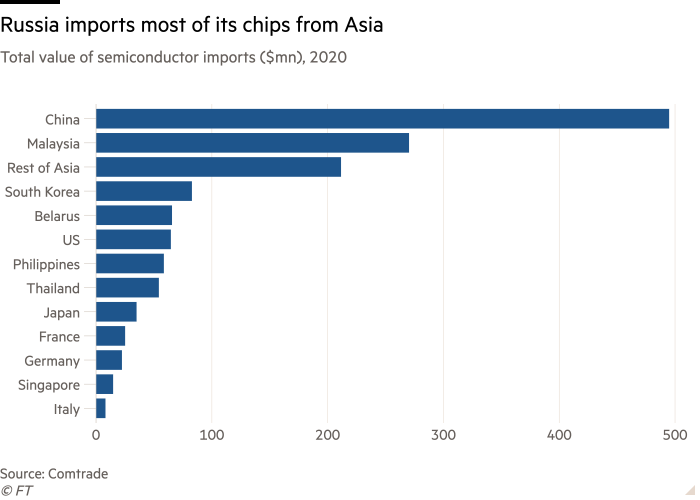Russian Drone Manufacturing Chain ... Toronto, Hong Kong Connection
"Due to the high demand for Orlans, we do not have the resources to do something else now. The demand for it is much bigger than we can produce.""Sanctions were imposed on us by one of the most powerful countries in the world.""We should be proud of this."Alexey Terentyev, major shareholder, top scientist, Special Technology Centre"[We are] very concerned [to hear of the shipments and would investigate. We do not have customers in Russia nor any products or services intended for Russia'.""We will take all appropriate action to address any identified diversion of products from lawful end use."Gumstix circuit board manufacturer, California
 |
| FT montage: Dreamstime |
Evasion and subterfuge are big when it comes to working around sanctions when there's money to be made. Commerce drives the world. National economies depend on it. Multinational corporations will do anything to fatten their bottom line. International corporate interests take little notice of whether the client they're selling to or investing in has irked other nations sufficiently to warrant blanket sanctions. Sanctions are bad for business, and best skirted if possible. And, it seems, regardless of the urgency of situations that merit sanctions to apply pressure on a rogue nation, there are always ways to skirt sanctions.
Business as usual is the key. And to that end, covert actions are polished up and life goes on. Just such a sanctions-evading supply chain threading through a Hong Kong marketplace operated by an expatriate Russian living in Toronto has been established in the best practise of underhanded business enterprises. Another connection runs through a contact in suburban Florida. The end game is the production of a Russian drone critical to Moscow's war effort in Ukraine.
Hundreds of those drones hover ominously over the battlefields in Ukraine. They're called "Sea Eagle" Orlan 10 UAVs, low-tech, inexpensive, killer drones involved in any of the 20,000 artillery shells fired daily by Russia on Ukrainian positions. Throughout 2022, up to 100 soldiers every day have been killed. according to Ukrainian commanders. A Russian media outlet, iStories, along with Reuters collaborated on an investigation.
A defence think tank in London -- Royal United Services Institute -- has also involved itself, and together a logistical trail spanning the globe, ending at the Orlan production line has been uncovered. The Special Technology Centre located in St.Petersburg, Russia. Russian customs filings and bank records revealed to the investigation a unique supply route for American technology, traced to a Russian manufacturer.
At one time the Special Technology Centre produced a variety of surveillance items for the Russian government; its focus currently is on drones for the military. It first came under notice during the Obama administration when it was revealed it worked with Russian military intelligence in an effort to influence the 2016 U.S. presidential election.
2017 sanctions barred U.S. citizens or residents or U.S. firms from supplying technology that could end up with the Special Technology Centre. Those sanctions were further tightened in March following the Russian invasion of Ukraine. All sales of high-technology items were blocked for sale to Russia, including microchips and communications and navigation equipment. Despite which production of the Orlan drone continues. The company is in the process of experiencing a "high demand" for its drones.
A Hong Kong-based exporter, Asia Pacific Links Ltd., is among the most important suppliers to the drone production program. According to Russian customs and financial records the Hong Kong exporter provided millions of dollars in parts indirectly. Many parts are in fact microchips produced by American manufacturers. An importer located in St.Petersburg with close ties to the Special Technology Centre is the recipient of Asia Pacific's Russian exports.
 |
| A semiconductor lithography machine produced by Mapper, of which TSMC was a customer. Along with rivals, the Taiwanese chipmaker has halted business with Russia Mapper Lithography/Reuters |
Expatriate Russian Anton Trofimov is Asia Pacific's owner. He graduated from a Chinese university and has business interests in China, along with a company in Toronto. Public records reveal that Trofinov resides in a modes East York neighborhood of Toronto, Canada. $1.8 million worth of chips made by Analog Devices were among parts sent by Asia Pacific to iLogic in 2022 made by Texas Instruments. Model aircraft engines made by a Japanese company, Saito Seisakusho, used in the Orlan 10 were included in the supplies. The Japanese company was unaware of the shipments.
And according to Texas Instruments no direct shipments or approval of shipments into Russia had taken place, the company was in complete compliance with all U/S. sanctions and export controls that would benefit Russia in its 'special military operation'. The Special Technology Centre's most important client is Russia's Ministry of Defence, which paid it close to 6 billion rubles between February and August of 2022.
51-year-old Igor Kazhdan, a U.S.Russian citizen, owns 1K Tech, which sold some $2.2 million of electronics to Russia between 2018 and 2021, over 98 percent of which were sold to iLogic. 1K Tech sold iLogic about a thousand U.S.-made circuit boards at a time that federal law banned whether directly or through another company any such technology to the Special Technology Centre. Valued at about $274,000, the boards were produced by California manufacturer Gumstix.
All together a sordid tale of circumvention and evasion with a profit motive more urgent than being in compliance with a sanctions protocol imposed on Russia for its violent conflict in Ukraine, destroying the country's civil infrastructure, killing tens of thousands of Ukrainian citizens as the Kremlin orders the unrestrained bombing of hospitals, schools, theatres, shopping centres, multiple apartment blocks and strategic energy lines, depriving the civilian population of the embattled country of winter heating and potable water.

Labels: Export Circumvention, Russian Invasion of Ukraine, Semiconductors, U.S. Sanctions
0 Comments:
Post a Comment
<< Home